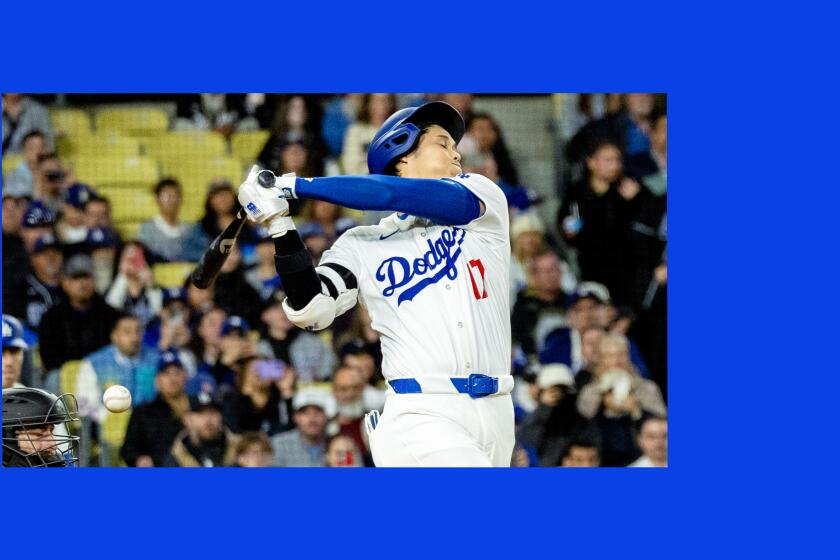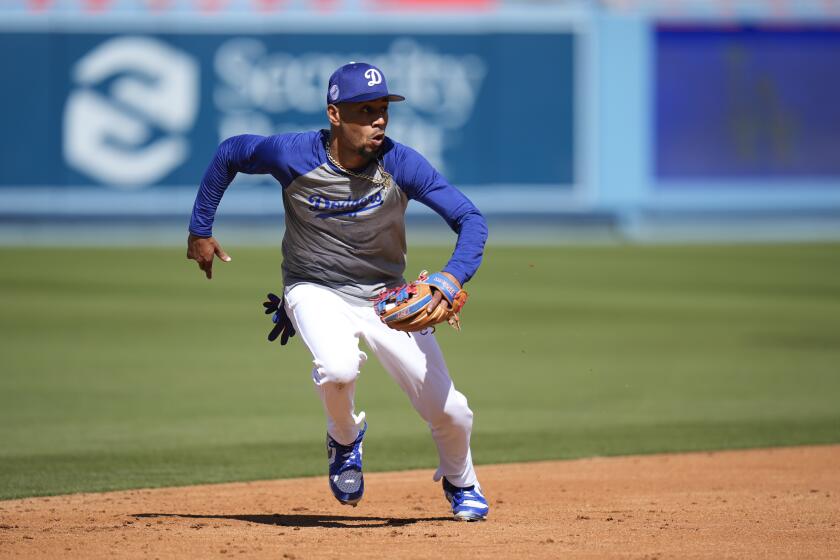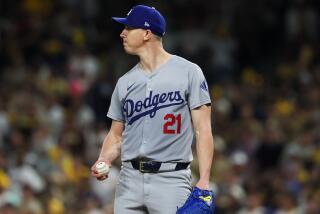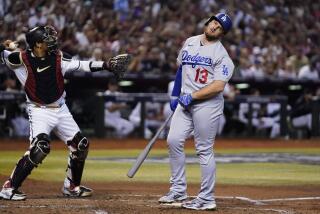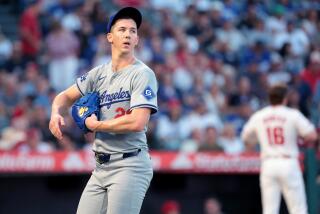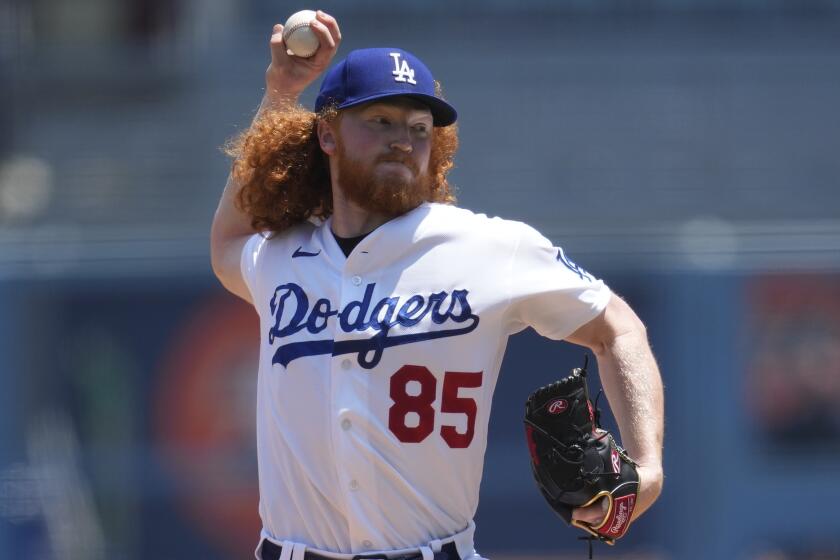Dodgers use bullpen game to beat Giants. Why more are expected this season
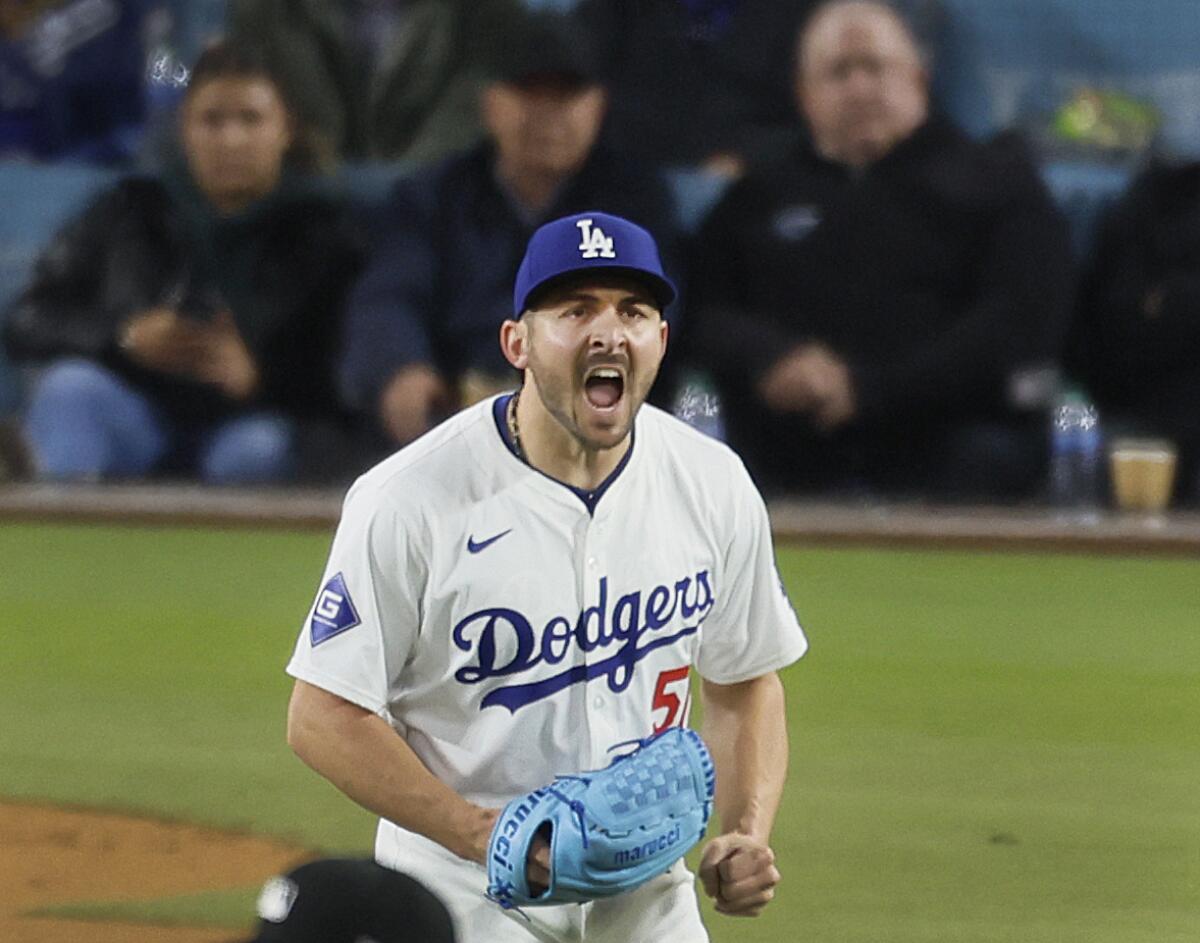
Clayton Kershaw would have loved to have seen Tyler Glasnow square off against Logan Webb on Tuesday night.
A national television audience on TBS, surely, would have too.
Instead, in the Dodgers’ 5-4 win against the San Francisco Giants at Dodger Stadium, it was Webb vs. Ryan Brasier … and Ryan Yarbrough … and Michael Grove … and the two other pitchers the Dodgers used in the first of what is likely to be many bullpen games this season.
“We’ve been doing it for quite some time,” manager Dave Roberts said. “I think we’ve been a lot of trailblazers for some ideas that have come with some resistance.”
Indeed, anyone surprised the club was already opting for such a patchwork pitching plan this early in the season probably shouldn’t be.
Over the last several years, as Roberts noted, the Dodgers have increasingly prioritized starting pitcher rest. The days of letting their rotation members actually take the ball once every five days have passed. Now, the team wants its starters getting five, six, even seven days off as often as possible, in hopes of preserving their health and maximizing their performance.
Shohei Ohtani has produced three doubles and three RBIs for the Dodgers, but he has admittedly looked somewhat out of sync with his swing.
That means, when choosing between a normal cycle through the rotation, or an occasional spot start/bullpen game to push everyone else back an extra day, expect the club to pick the latter as often as it can.
“Ultimately,” Roberts said of giving his rotation extra rest, “we feel that their recovery is better and they perform better over the long haul.”
Thanks to the Dodgers’ widely envied ability to replenish pitching depth — through prospect development, savvy player personnel decisions and a trademark ability to help overlooked veteran arms make marginal improvements — they can do so without necessarily sacrificing success.
Tuesday night offered the latest example.
After a scoreless opening inning from Brasier, Yarbrough did just enough in his swingman role, preserving an early lead despite yielding four runs in 4⅓ innings.
From there, Grove, Alex Vesia and Evan Phillips, who recorded a four-out save, got the Dodgers across the finish line — ensuring that offensive contributions from Mookie Betts (two hits, including his fifth home run of the season), Freddie Freeman (three hits, his third such performance in the last four games) and Kiké Hernández (who had a key two-run single in the fourth) didn’t go to waste.
“We just feel with our depth,” Roberts said, “we can kind of piece [a pitching plan] together.”
That doesn’t mean it’s ideal for the state of the game.
For much of his future Hall of Fame career, Kershaw has embodied an opposite philosophy. Five times, he has topped 200 innings in a season. Up until 2017, the majority of his starts came on normal — or, at least what was once considered normal — four days’ rest.
“Personally, I love it,” Kershaw said of the standard five-man routine. “I’d much rather see a bunch of guys I know throwing every fifth day.”
However, like all the pitchers in the Dodgers organization — and an increasingly large share of starters as a whole around the league — the norms of pitching schedules have slowly changed in recent years.
Even Kershaw’s workload has been altered, with the three-time Cy Young Award winner getting five days’ rest or more before 94 of his 132 starts over the last six years.
“I don’t think anybody really knows the right answer,” Kershaw said of what has become an industry-wide trend. “Guys throw harder. It’s more taxing. So I think we’ve kind of reached that point where, if everybody throws this hard, then maybe your arm just needs more time to recover.”
“At least the Dodgers,” Kershaw added, “are trying to figure it out.”
In some ways, the team — which is also staying away from a straight six-man rotation to maintain a full eight-man bullpen — is acting as if it already knows the answer.
By going with a bullpen game Tuesday, the club was able to give Glasnow, its opening day starter, five days off between last week’s home opener and Wednesday’s series finale.
The other four members of the team’s rotation — Bobby Miller, Yoshinobu Yamamoto, Gavin Stone and James Paxton — will all get a six-day break before making their next outings in the coming week, thanks to the Thursday off day that precedes their Chicago-Minnesota trip.
“We’re gonna kind of take it easy here in the beginning to give guys those extra days, get that good rest and build up that base,” Paxton said after his season debut Monday night. “Then I’m sure we’ll get going on a more regular schedule.”
Don’t bet on it.
Mookie Betts’ move to shortstop has sharpened his focus on the game, especially at the plate so far this season for the Dodgers.
While the Dodgers have long prioritized starting pitcher rest — last year, the team started a pitcher on four days’ or fewer rest only 51 times, including a handful of one-inning openers — the make-up of their pitching personnel this season has underlined that objective like never before.
Glasnow and Miller are coming off career-high innings totals in 2023, prompting the club to be careful with workloads in at least the early portion of this year.
Yamamoto is accustomed to the once-per-week schedule he had in Japan’s Nippon Professional Baseball league, one the Dodgers aren’t rushing to change in his first MLB season.
A veteran such as Paxton might benefit from longer breaks, most of all. Last year, in the 35-year-old’s return from Tommy John surgery, Paxton had a 9.39 ERA in four starts on regular rest, compared to a 3.57 mark in 15 outings with five days or more.
“You keep guys frisky all the way through [the season],” Roberts said. “So I do think that more teams are starting to do it this way.”
It all comes with a big-picture cost, of course.
Had the Dodgers stuck to a normal rotation turn Tuesday, rather than a spot bullpen game, the 49,365 at Chavez Ravine would have been treated to a matchup of aces in Glasnow and Webb. Wednesday night would have featured Miller and Giants left-hander Kyle Harrison, two of the better young pitchers in MLB.
“When you go to a baseball game as a fan, I love to see name recognition from the starting pitching,” Kershaw said. “I want to see the Logan Webb versus Glasnow [game] … I want to see those big-name guys.”
The potential cost, however, is that the more regular-rest starts a pitcher makes, the more their performance dips and odds of injury rise. For a club with World Series aspirations like the Dodgers, the name of the game now is keeping their top arms healthy for October, and leaning on their depth to get through the regular season.
Tuesday night was the first reminder of that cold-blooded calculus.
For this season’s team, it assuredly won’t be the last.
“I think you’re starting to see the industry kind of follow what we’ve been doing for years,” Roberts said. “It’s hard to debate the track record.”
More to Read
Are you a true-blue fan?
Get our Dodgers Dugout newsletter for insights, news and much more.
You may occasionally receive promotional content from the Los Angeles Times.

